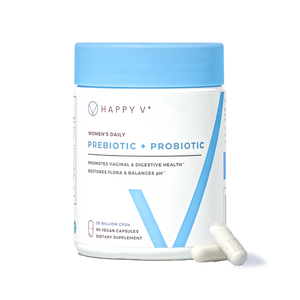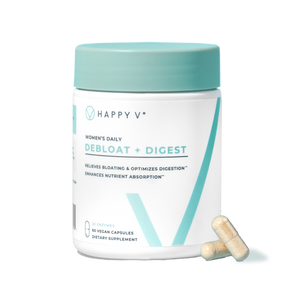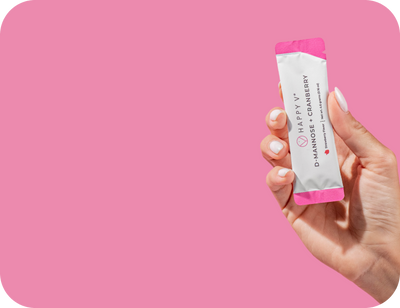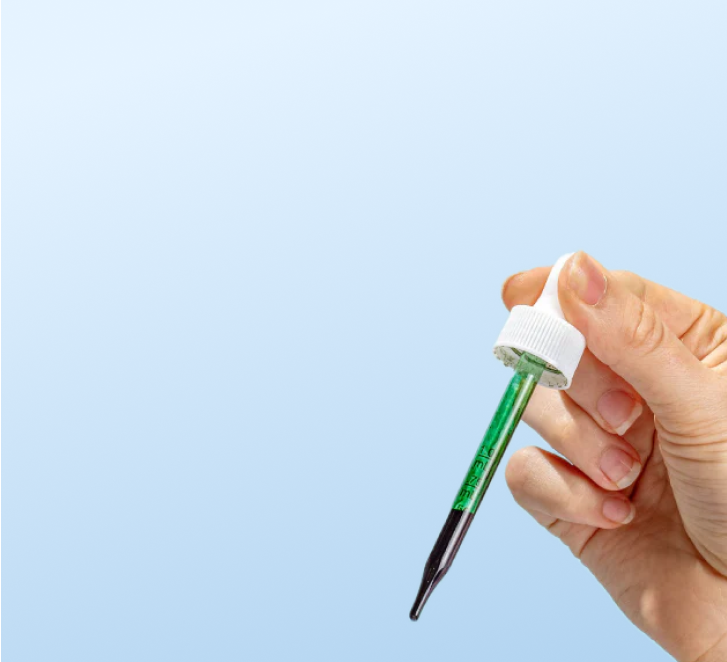- Fact Checked
- October 21, 2025
- 15 min read
Myo-Inositol & D-Chiro-Inositol: The Power Duo for Hormonal Balance
Table of Contents
Table of Contents

Feeling frustrated by irregular cycles, stubborn acne, or constant fatigue that doesn’t let up, even after a good night’s sleep? You’re definitely not alone.
Hormonal imbalance can make you feel like your body’s working against you. And while we aren’t taught a whole lot about hormones in school, getting them back in balance often comes down to the right mix of supplements and lifestyle changes.
When it comes to supplements for hormonal balance, one duo stands apart: myo-inositol and d-chiro-inositol. These science-backed nutrients have been shown to support ovulation, improve insulin sensitivity, and promote clearer skin, steadier moods, and more predictable periods, but only if you take them at the right levels.
This post is for informational purposes only and does not constitute medical advice. See full disclaimer below.
What Exactly Are These Inositols?

Though few people know what an inositol is, the truth is, your body relies on them every day. They’re a type of sugar-like molecule that helps your cells communicate and function properly. Think of them like the wiring that keeps your body’s messaging system running smoothly1.
There are nine types of inositols in nature2, but when it comes to hormonal and metabolic health specifically, myo-inositol and d-chiro-inositol are the real MVPs.
Your body maintains a specific ratio of these two inositols, and it’s one you’ll want to remember—40:1. That means there are 40 parts myo-inositol to 1 part d-chiro-inositol. Amazingly, most of the time, your body can convert one to the other as-needed to maintain this ratio. When someone is experiencing hormonal imbalance or insulin resistance, though, this can mess with the body’s ability to do this conversion, causing the ratio to be off. That’s when you see symptoms like irregular periods, acne, fatigue, and fertility issues.
How Do Inositols Work?
Inositols aren’t just floating around in your body. They’re actually built right into your cell membranes, helping your hormones send clear, effective messages throughout your body to make sure insulin, reproductive hormones, and other key reproductive and metabolic messengers do their jobs without static on the line3.
While the nine inositols are working together towards this larger goal of effective communication, each one plays a unique and complementary role. D-chiro-inositol helps your body turn glucose into usable energy more efficiently4, while myo-inositol supports insulin sensitivity and encourages your cells to take in glucose properly. Together, they keep your blood sugar balanced, your energy steady, and your hormones communicating the way they should.
Signs Your Inositols Might Be Out of Balance

Some people never have to learn about what inositols are or what they do. But many other experience signs that the ratio between myo-inositol and d-chiro-inositol is off. This could be due to insulin resistance, poor sleep, or hormonal changes due to pregnancy or premenopause. But whatever the reason, your cells stop communicating as effectively, which can create a ripple effect of symptoms.
Common signs of inositol imbalance include:
- Irregular or missing periods that make it hard to track your cycle or predict ovulation
- Unexplained acne or oily skin, especially along the jawline and chin
- Thinning hair or excess hair growth in places you don’t want it
- Fatigue or low energy, even when you’re eating well and getting enough rest
- Stubborn weight gain or difficulty losing weight, especially around the midsection
- Fertility struggles or inconsistent ovulation
- Mood swings or brain fog that seem tied to your cycle
If you’re experiencing these symptoms, targeted supplementation may be a good option. Let’s dig a little deeper into what the science has to say about supplements and how they work in key areas of women’s health.
The Top 3 Benefits: Where Inositol Supplements Excel
Inositol supplements aren’t the same as a daily vitamin, meaning they aren’t seen as part of a general overall wellness routine. But the science shows that targeted supplements can be useful when combating certain health concerns, especially:
1. Polycystic Ovary Syndrome (PCOS) Support
Inositols’ stellar reputation in the natural remedies world really stems from how they can benefit the millions of women managing PCOS5.
Research shows that myo-inositol and d-chiro-inositol can make a major difference in managing symptoms like irregular cycles, acne, unwanted hair growth, and fertility challenges.
Understanding the PCOS-Inositol Connection
Remember that 40:1 ratio we talked about for myo-inositol and d-chiro-inositol? In ovarian fluid, this ratio is a bit different. In healthy women, the ratio of myo-inositol to D-chiro-inositol in ovarian fluid is about 100:1, but in women with PCOS, it can drop to 0.2:1!
This is a major imbalance that disrupts ovulation and hormone production and can lead the ovaries to produce excess androgens (like testosterone) that drive common PCOS symptoms. Targeted, high-quality supplementation of myo-inositol and d-chiro-inositol can bring ratios throughout the body back in balance, which in turn improves ovarian function, promotes ovulation, and boosts overall fertility.
Real Results from Clinical Trials
Supplementation doesn’t just work in theory. We actually have strong science to support it.
In one study, 88% of women with PCOS taking 2g of myo-inositol with folic acid twice daily had a menstrual cycle return within about 35 days, and most continued to ovulate regularly. Another study found significantly higher pregnancy rates and better-quality eggs among women taking myo-inositol compared to those who didn’t.
For women undergoing fertility treatments, inositol supplementation shortened ovulation induction time, reduced medication doses, and improved outcomes, making treatments both more affordable and gentler on the body.
Benefits for Lean Women with PCOS Too!
While many women with PCOS do struggle with weight, studies in lean women with PCOS showed that 600mg of D-chiro-inositol daily improved insulin levels, blood pressure, testosterone, and triglycerides. This proves the imbalance itself—not just weight or insulin resistance—can drive hormonal symptoms.
2. Hormonal Balance and Menstrual Cycle Regularity

Even if you don’t have PCOS, you can still struggle with irregular cycles, acne, and uncomfortable PMS symptoms. This is another area when inositols can help your hormones find their natural rhythm again.
Studies show that myo-inositol can lower testosterone levels and bring cycle length back to an average of about 31 days, which is a huge win for anyone dealing with unpredictable periods.
Together, myo-inositol and D-chiro-inositol support every stage of your menstrual cycle6, from follicle development to ovulation to the luteal phase (aka when most PMS symptoms appear!). By enhancing FSH receptor activity and supporting insulin balance, they help restore the natural ebb and flow your body was designed for.
3. Blood Sugar, Insulin, and Heart Support

Inositols don’t just benefit reproductive health. They also play a major role in metabolic wellness. Think of them as gentle regulators helping your body use insulin more effectively, balance blood sugar, and even support cardiovascular health, which is particularly important for women with higher BMIs or who are in perimenopause or menopause.
Blood Sugar and Insulin Support
For women dealing with prediabetes, gestational diabetes, or general insulin resistance, inositols can make a noticeable difference.
D-chiro-inositol helps convert glucose into usable energy, while myo-inositol improves how your cells respond to insulin. Together, they reduce the demand on your pancreas and help stabilize blood sugar levels naturally.
Research shows that inositol deficiencies are linked to impaired insulin signaling. In fact, people with diabetes or PCOS tend to have an altered myo- to D-chiro-inositol ratio, which inositol supplementation can help correct.
Cardiovascular Wellness
Your heart health and hormone health are more connected than you might think, especially during perimenopause, when estrogen levels begin to fluctuate and cardiovascular risk naturally increases. These hormonal shifts can affect how your body manages insulin, cholesterol, and inflammation, making it even more important to support metabolic balance.
Clinical research shows that D-chiro-inositol can help lower insulin levels, testosterone, blood pressure, and triglycerides, four key markers tied to cardiovascular health. By improving how your body processes glucose and uses insulin, inositol supplementation targets one of the root causes of metabolic syndrome, a condition that affects millions of women and significantly increases heart disease risk.
By restoring insulin sensitivity and reducing inflammation, inositols do more than balance hormones; they help protect your heart, stabilize your metabolism, and boost energy from the inside out. Supplementation should especially be considered for women who are experiencing perimenopause or menopause.
Other Uses for Inositol Supplements
While PCOS, menstrual health, and metabolic balance are the most well-studied areas where inositols shine, research continues to uncover their broader benefits across women’s health. Here are some other use cases for inositol supplements with some promising science behind them.
Gestational Diabetes Prevention and Pregnancy Support

The hormonal changes can sometimes make the management of blood sugar tricky. Leading to gestational diabetes. Studies show that myo-inositol may help prevent or manage gestational diabetes that develops during pregnancy7. This not only protects maternal health but may also benefit fetal development and lower the risk of complications like preterm birth.
For women who are pregnant or planning to conceive—especially those with a family history of diabetes or metabolic concerns—combining myo-inositol with folic acid is a safe, natural way to promote balanced blood sugar and overall wellness throughout pregnancy. Just be sure to talk with your OB/GYN before beginning any kind of regimen.
Fertility Enhancement and IVF Support
Whether you’re trying to conceive naturally or undergoing fertility treatments, inositols can help your body create the best possible environment for conception8.
Myo-inositol plays a key role in egg quality and maturation within the ovary, while D-chiro-inositol supports energy production and insulin balance, two crucial factors for reproductive success. In clinical studies, women taking a 40:1 combination of myo-inositol and D-chiro-inositol through supplements saw improved egg and embryo quality and higher pregnancy rates during IVF cycles.
Even better, inositol supplementation has been shown to reduce the risk of ovarian hyperstimulation syndrome (OHSS), a potential side effect of fertility treatments, and lower the required doses of fertility medications, making the entire process safer, smoother, and more cost-effective.
Mood, Mental Health, and Emotional Well-Being
Your hormones and mood are deeply connected, and emerging research suggests that inositols may help support emotional balance and mental clarity by helping neurotransmitters that signal serotonin and dopamine (aka neurochemicals that make you feel happy and calm).
For this reason, inositol supplements may be helpful in dealing with PMS-related mood swings, mild anxiety, or brain fog, especially when paired with supportive nutrients like vitamin D and ashwagandha.
If you feel like your mental health symptoms are severe, or if you’re having thoughts of harming yourself, please reach out for immediate help by calling or texting 988. This will connect you to the Suicide and Crisis Lifeline, where there are trained counselors available 24/7.
Please Reach Out
Cellular Health and Development
At their core, inositols help your cells do what they’re meant to do—grow, communicate, and repair. Research shows that myo-inositol helps regulate key enzymes involved in cell growth and metabolism, both of which are essential for maintaining long-term health.
This becomes especially important during pregnancy, when your body is building and supporting new life. Adequate inositol levels help ensure healthy cell development for both you and your baby. Animal studies show that low inositol levels during early development can interfere with normal fetal growth patterns, which is why maintaining balance is so important.
If you’re pregnant, remember it’s always best to discuss any supplements, including inositol, with your OB-GYN. They can help determine the right dosage and ensure it fits safely into your prenatal care plan.
Safety, Side Effects, and What to Expect
Inositol supplements are generally considered very safe, and because inositols are naturally occurring in the body, they tend to work gently and gradually to restore balance, unlike some other hormonal balancing treatments.
Most people who take inositols experience no side effects at all. In rare cases, some report mild digestive discomfort, but this is usually temporary and resolves on its own in a few days or weeks. Clinical trials using both myo-inositol and D-chiro-inositol found no serious adverse effects, even after several months of daily use.
Pregnancy and Nursing Safety

Inositol supplementation is often considered safe during pregnancy, particularly for women managing gestational diabetes or PCOS-related fertility challenges, though research on its use while breastfeeding is still limited. If you’re pregnant, trying to conceive, or nursing, it’s important to discuss any supplement, including inositol, with your OB-GYN before starting. They can help determine if it’s right for you and guide you on the correct dosage.
When to Expect Results
As with any kind of supplement or natural remedy, consistency matters. Inositols are not a quick fix, but rather a gentle way to naturally align your body’s natural rhythm over time.
Most women who take inositol supplements daily begin noticing changes in 1–3 months, with optimal results appearing around 3–6 months.
When it comes to combating specific health issues or medical conditions, clinical research has found that:
- Women with PCOS often regained their first menstrual cycle after about 4–5 weeks of supplementation.
- Cycle regularity and ovulation improved steadily, averaging around 31 days per cycle.
- Metabolic benefits—like improved insulin sensitivity, blood pressure, and triglyceride levels—were seen within 6–8 weeks.
- Fertility outcomes and egg quality improvements appeared after 3–6 months of consistent use.
Choosing the Right Inositol Supplement
Not all inositol supplements are created equal. If you’re going to invest in your hormonal health, you want to make sure you’re choosing one that’s actually formulated to work.
The key is the ratio. Look for a supplement that uses the clinically validated 40:1 ratio of myo-inositol to D-chiro-inositol. If a product doesn’t clearly list this ratio—or worse, doesn’t show dosage amounts on the back—that’s a red flag. Transparency matters, and you should always know exactly what you’re putting into your body.
Happy V Ovarian Support delivers the research-backed 40:1 inositol ratio, plus a blend of proven, hormone-supportive nutrients that work together to help your body rebalance naturally, including:
- Diindolylmethane (DIM) – Supports healthy estrogen metabolism and helps maintain ovarian and hormonal balance
- Selenium – Provides antioxidant protection for ovarian cells and supports egg quality
- BroccoRaphanin® (Broccoli Seed Extract) – Reduces oxidative stress in ovarian cells and promotes overall reproductive and metabolic health
- Zinc Citrate – Supports healthy hormone activity and menstrual cycle balance
Together, these ingredients amplify the benefits of myo- and D-chiro-inositol, offering a comprehensive approach to hormonal wellness.
Whether you’re supporting fertility, managing PCOS, or simply aiming for more predictable cycles, Happy V Ovarian Support gives your body what it needs to restore balance.
Beyond Supplements: A Holistic Approach to Hormonal Health
While inositol supplements can be a game-changer for hormonal and metabolic balance, they’re most effective when supported by healthy, consistent habits, especially:
Eating balanced, nutrient-rich meals
Focus on whole foods that stabilize blood sugar, like lean proteins, fiber-rich vegetables, healthy fats, and complex carbs. Reducing refined sugars and processed foods also helps keep insulin levels steady9.
Moving your body regularly
Exercise doesn’t have to mean hours in the gym. Even daily walks, gentle yoga, or strength training can improve insulin sensitivity, boost mood, and support hormonal balance.
Getting consistent, high-quality sleep
Poor sleep affects everything from cortisol levels to appetite and insulin regulation. Aim for 7–9 hours a night, and try to keep a consistent bedtime routine to help your hormones reset. If you struggle with sleep apnea or insomnia (which is common in women with PCOS), talk to your doctor who can connect you with a sleep specialist.
Do Women Need More Sleep Than Men? Let's Talk About It! Find out how much lack of sleep affects women's health.
Managing stress
Chronic stress can disrupt hormone signaling, raise cortisol, and interfere with reproductive health10. Small, consistent practices like meditation, deep breathing, journaling, or even short breaks outdoors can help keep stress in check.
Staying connected to your healthcare provider
Regular check-ins with your OB-GYN or healthcare practitioner can help track your progress, fine-tune dosages, and monitor key health markers like cycle regularity, insulin levels, and lipid profiles.
When these elements work together—nutrition, movement, rest, stress management, and professional support—inositol dietary supplements can shine. Think of them as one piece of your wellness puzzle, helping your hormones, metabolism, and energy realign so your body can thrive from the inside out.
Final Thoughts
Balancing your hormones isn’t about quick fixes, but giving your body what it needs to function as it should. Myo-inositol and D-chiro-inositol supplements help restore that natural balance, supporting steady cycles, improved energy, and better overall well-being.
For best results, choose a supplement that lists the 40:1 ratio, like Happy V Ovarian Support, which combines inositols with selenium, BroccoRaphanin®, and zinc.
When taken consistently and paired with healthy habits, inositols can help your body find its rhythm again—naturally and effectively.
Keep the Conversation Going
- Visit our blog for more on BV treatment options and women's health tips.
- Join our private Happy V Facebook group to hear from others who've been there.
- Explore supplements designed to support your vaginal health journey.
Disclaimer: This blog is for informational and educational purposes only and is not intended to diagnose, treat, cure, or prevent any disease. Statements about supplements have not been evaluated by the Food and Drug Administration. For more information about vaginal infections, visit the CDC or speak to a licensed healthcare provider.














